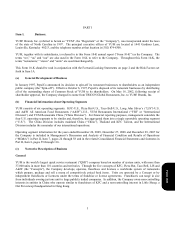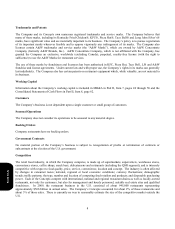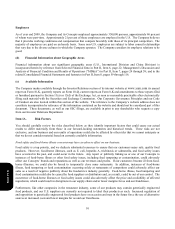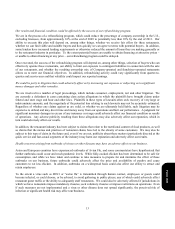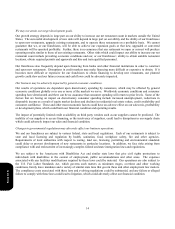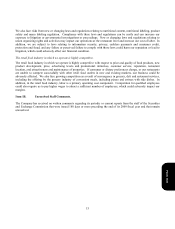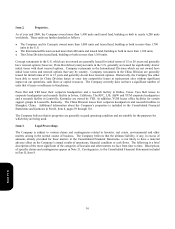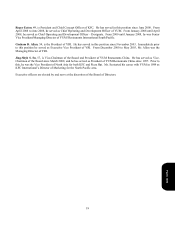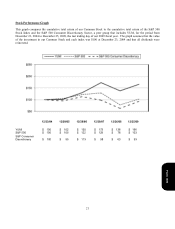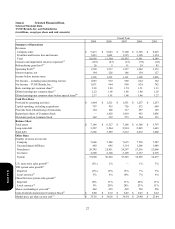Pizza Hut 2009 Annual Report Download - page 104
Download and view the complete annual report
Please find page 104 of the 2009 Pizza Hut annual report below. You can navigate through the pages in the report by either clicking on the pages listed below, or by using the keyword search tool below to find specific information within the annual report.
13
Our results and financial condition could be affected by the success of our refranchising program.
We are in the process of a refranchising program, which could reduce the percentage of company ownership in the U.S.,
excluding licensees, from approximately 16% at the end of 2009 to potentially less than 10% by the end of 2011. Our
ability to execute this plan will depend on, among other things, whether we receive fair offers for these restaurants,
whether we can find viable and suitable buyers and how quickly we can agree to terms with potential buyers. In addition,
some lenders have increased lending requirements or otherwise reduced the amount of loans they are making generally or
to the restaurant industry in particular. To the extent potential buyers are unable to obtain financing at attractive prices –
or unable to obtain financing at any price – our refranchising program could be delayed.
Once executed, the success of the refranchising program will depend on, among other things, selection of buyers who can
effectively operate these restaurants, our ability to limit our exposure to contingent liabilities in connection with the sale
of our restaurants, and whether the resulting ownership mix of Company-operated and franchisee-operated restaurants
allows us to meet our financial objectives. In addition, refranchising activity could vary significantly from quarter-to-
quarter and year-to-year and that volatility could impact our reported earnings.
We could be party to litigation that could adversely affect us by increasing our expenses or subjecting us to significant
money damages and other remedies.
We are involved in a number of legal proceedings, which include consumer, employment, tort and other litigation. We
are currently a defendant in cases containing class action allegations in which the plaintiffs have brought claims under
federal and state wage and hour and other laws. Plaintiffs in these types of lawsuits often seek recovery of very large or
indeterminate amounts, and the magnitude of the potential loss relating to such lawsuits may not be accurately estimated.
Regardless of whether any claims against us are valid, or whether we are ultimately held liable, such litigation may be
expensive to defend and may divert time and money away from our operations and hurt our performance. A judgment for
significant monetary damages in excess of any insurance coverage could adversely affect our financial condition or results
of operations. Any adverse publicity resulting from these allegations may also adversely affect our reputation, which in
turn could adversely affect our results.
In addition, the restaurant industry has been subject to claims that relate to the nutritional content of food products, as well
as claims that the menus and practices of restaurant chains have led to the obesity of some customers. We may also be
subject to this type of claim in the future and, even if we are not, publicity about these matters (particularly directed at the
quick service and fast-casual segments of the industry) may harm our reputation and adversely affect our results.
Health concerns arising from outbreaks of viruses or other diseases may have an adverse effect on our business.
Asian and European countries have experienced outbreaks of Avian Flu, and some commentators have hypothesized that
further outbreaks could occur and reach pandemic levels. While fully-cooked chicken has been determined to be safe for
consumption, and while we have taken and continue to take measures to prepare for and minimize the effect of these
outbreaks on our business, future outbreaks could adversely affect the price and availability of poultry and cause
customers to eat less chicken. In addition, outbreaks on a widespread basis could also affect our ability to attract and
retain employees.
To the extent a virus such as H1N1 or “swine flu” is transmitted through human contact, employees or guests could
become infected, or could choose, or be advised, to avoid gathering in public places, any of which could adversely affect
restaurant guest traffic or the ability to adequately staff restaurants. We could also be adversely affected if jurisdictions in
which we have restaurants impose mandatory closures, seek voluntary closures or impose restrictions on operations. Even
if such measures are not implemented and a virus or other disease does not spread significantly, the perceived risk of
infection or significant health risk may affect our business.
Form 10-K


